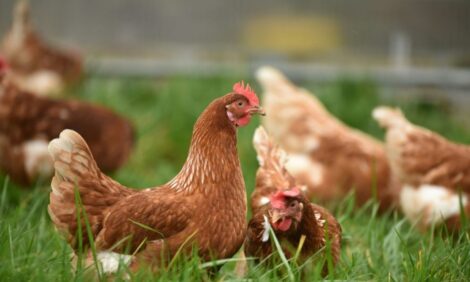



The Effect of Dietary Supplementation on Egg Vitamin Content
Eggs were successfully enriched with a number of vitamins as the result of feeding elevated levels of those vitamins in the diets of laying hens, according to this research from DSM Nutritional Products.Nutrients are deposited into eggs by hens to allow growth of the embryo should the egg be fertilized. Eggs produced for consumption are usually not fertilised, but may contain a significant proportion of the recommended daily intake of various vitamins for humans.
The egg content of several vitamins can be manipulated with relative ease. A laying hen vitamin premix was developed with the intention of increasing the vitamin content of eggs relative to a control premix. The control and experimental diets contained the following levels of supplemental vitamins: A, 11,600 or 23,200 IU/kg; E, 36 or 91 IU/kg; menadione, 1.8 or 11.8 mg/kg; folic acid, 1.4 or 4.4 mg/kg; B12, 16 or 116 mg/kg; riboflavin, 8 or 48 mg/kg; pantothenic acid, 16 or 76 mg/kg; thiamine, 2.4 or 11.4 mg/kg; and biotin, 200 or 450 mg/kg, respectively. Vitamin D (3,760 IU/kg), niacin (80 mg/kg) and pyridoxine (4.0 mg/kg) levels were the same in both diets. Each diet was fed to a commercial flock of laying hens. Feed samples and eggs were collected from both flocks at 6 weeks of supplementation and analysed for levels of the following vitamins: A, E, K, B12, folacin, riboflavin, pantothenic acid and thiamin.
Egg vitamin concentrations were analysed using ANOVA using the General Linear Models procedure of SAS. Differences were considered significant at P<0.05.
Average vitamin contents (µg/60 g egg unless otherwise noted) of the control eggs were: vitamins A, 464 IU/egg; E, 2.19 IU/egg; B12, 0.72; folic acid, 28.31; riboflavin, 204; thiamin, 239; and pantothenic acid, 842. The researchers found increased egg concentrations of vitamins A (34.65 per cent), E (135.67 per cent, B12 (28.1 per cent), thiamin (65.4 per cent), folic acid (59.5 per cent), riboflavin (36.3 per cent), and pantothenic acid (111.4 per cent) relative to the control eggs, whereas vitamin K concentrations were not increased.
The enriched eggs could be claimed to be an excellent source of vitamins E, B12 and thiamin; and a good source of vitamin A, folic acid, riboflavin and pantothenic acid according to the Food and Drug regulations of the Canadian Food Inspection Agency.








